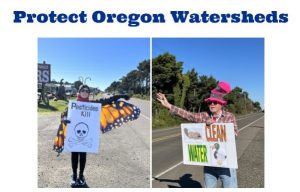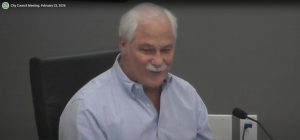Think globally, act locally: Stop aerial spraying at Beaver Creek
8 min read
Lincoln County voters once banned aerial spraying, but their ordinance was thrown out by a state court. The state of Oregon has now approved aerial spraying of dangerous chemicals above Beaver Creek, spraying that could start as early as Sept. 2. Residents of the Seal Rock Water District are asking everyone in Oregon to join them as water protectors.
[00:00:19] (Marbled murrelets flying over the wetlands)
[00:00:25] Willow Kasner: I’ve been up there, because I grew up on this land. I’ve been here, my family’s been here for five generations.
[00:00:31] We have the seabirds that fly over our wetlands, we hear them at night.
[00:00:34] We have the marbled murrelet which is endangered, which is why they live up here. They live up in the big trees in the older growth forests, in the headlands and upstream. It takes a whole long time to find them. But they’re here. There’s at least, there’s at least a couple, because once I learned what it was, I’ve always wondered what that sound was between a calf and a crow.
[00:00:57] (Marbled murrelets)
[00:01:06] Willow Kasner: You know? Because we all grew up playing in the forest here, riding horses around, having our cattle healthily on the grass.
[00:01:12] My cousin has a horse and cattle ranch right in the wetland, right where the spray will accumulate. She’s got a huge section of wetland. I’ve got a smaller section. I’m letting my farm, my family farm, turn back into a wetland.
[00:01:25] And I allow campers to come out here and enjoy it. I also have events, once in a while, and so what do I do with people staying here? You know, I’ve got a memorial coming up in two weeks. I’ve got a group campout this weekend with a whole bunch of families and children. What do I do if they start spraying, you know?
[00:01:41] This is one of the most important coho salmon runs, coastal coho salmon runs in Oregon. And it’s not being protected.
[00:01:49] The president just awarded millions of dollars to upkeep the salmon coho runs and different endangered species and so they’re spending all this money to save the salmon and to save these species and to restore habitat and at the same time the state is allowing this destruction to happen on a local level.
[00:02:09] And this is why it’s such a big Oregon statewide issue and not just a Lincoln County issue because 40% of Oregon timberlands are owned by private timber industry and companies.
[00:02:22] The Oregon Forestry Act is made in a way that, basically, all they have to do is notify the Forestry Department, the Oregon Forest—ODF—and then they have the right to go ahead and spray, if their plan is, you know, upholding to the law, which I’ve read the written plans, and our particular spray, the Beaver Creek Aerial Spray, is such a basic, cookie-cutter written plan.
[00:02:49] It doesn’t account for so many things we feel it needs to be accounted for in order to be an acceptable written plan, but we don’t have the go-ahead because the office already says it falls within the rules, it’s acceptable. And clearly it’s not acceptable.
[00:03:07] There’s about 10 houses within 100 to 300 feet of the spray, so right next to the target line. And there are buffers they have to uphold, which is 300 feet away from a house. And a certain amount away from creeks. Most of us are within a mile of spray zones.
[00:03:21] A couple of people in the community had, were already plugged into the Department of Forestry online notification system, which is called FERNS.
[00:03:33] We sent in, by the deadline, almost 100 comments to the Toledo Department of Forestry, West Oregon Division, and they in the past had received maybe a few altogether from any of these, any of these, situations. So going from zero to a few written comments we went up to 100, almost 100.
[00:03:56] And also in that time period, over 2,000 signatures on a petition that went around within about a week and a half as well. We’re not anti-logging, we’re anti-poisoning without our consent. Non-consensual contamination and poisoning.
[00:04:11] Our first meeting we had, there were about 40 people or more, about 20 in person and about 20 on Zoom, and basically what he says, there is nobody here, nobody that can overrule this Oregon Forestry Act. It’s law, basically.
[00:04:27] The landowner himself has to decide to stop it. So based on everything that’s going on in the community uproar and all of the media coverage and all of the officials, we’re hoping and we are praying and putting our faith in the fact that they will not want to spray us after all of the uproar and all the concern.
The state representative, David Gomberg, has been out. He was at the meeting. He’s made posts about it. He’s made, you know, in his weekly information that he sends out to everybody. It’s been in it a couple different weeks, at least. He’s been asking, he’s sent notifications to the consultant company in Washington (state) that runs the ANE Forests of Oregon, which is, it’s Sorn Nymark is the owner, and he is from Denmark.
[00:05:16] So (Rep.) Gomberg has reached out, I assume more than once, to ask for a meeting between him, state officials, local officials, and the Seal Rock Water District.
[00:05:29] They’re looking into plugging into their second water source, the Siletz water sources which they had before they got the Seal Rock as the water source. And it’s going to cost quite a bit of money if they can’t serve over a certain dangerous amount of chemicals.
[00:05:44] The problem is that the Siletz water source has also had an aerial spray application put in for their area as well. So it’s extra scary because everybody’s getting it kind of at once right now.
[00:05:57] And I border the creek, Beaver Creek. And so all of our water sources come from downstream of these sprays that are going to happen.
[00:06:05] And so we all have to take samples of our water, our soil, and possibly our urine, now as they sample, get them tested at a lab, sampling the whole entire time, throughout the spray and after, for months, especially once the rains start.
[00:06:24] Once the rains come, then all these chemicals that have been sitting on the soil they roll down into the groundwater that way, and they also roll down through runoff and it comes directly down to all their water sources.
[00:06:36] And these test costs, the last test somebody looked into a lab, the last one that we found was upwards of $200 per test. Per sample.
[00:06:46] You know, everybody basically that we’ve talked to in the county is on board with stopping this spray and eventually changing the laws at a state level, changing legislature because it is, it is completely unfair. This is the United States of America, supposedly, and we are just in this whole, we are in this whole global problem, way bigger than Oregon, global problem of big companies being able to get through laws because they’re either made too easy in favor of them or because they are archaic laws, archaic rules that do not apply to the situation nowadays.
[00:07:25] This is happening all over the world. I see this, it comes to me from Costa Rica, it’s a mother and grandmother and baby on the cover, ‘Don’t let them poison our water,’ basically.
[00:07:35] So it’s this is worldwide, and as we know, there’s a million crazy things happening worldwide. all we can really do is start with ourselves. And we’re not allowed legally to start with ourselves. That’s the problem.
[00:07:48] Because in 2017, our county did pass a ban, to ban aerial spraying. In 2017, Lincoln County passed that ban by popular vote, but because of the preemptive law, which basically states the county does not have the right to make a law or change a law underneath of the state, the state has power to take that back.
[00:08:13] So they went into court, it lasted about a couple years, went into court, and of course got overturned because deep in there is the preemptive law.
[00:08:24] And so we were told in that very first meeting at the Seal Rock (Water) District. That the only way to change legislation is from the top down. So that’s what we have to do. And we need everybody to join in on that. As soon as possible. Ideally in the next couple days.
[00:08:42] We need your help right now. Please help us protect all of Lincoln County, all of Oregon. This has got to stop. There are things in this world we cannot control at this point. However, this one we can. That’s why we need to do it. That’s why we need to stand together.
[00:08:59] Get this legislation changed. And in the meantime, get this particular aerial spray not to happen. Not to happen. We do not need more of our precious ecosystems poisoned. a lush, beautiful, beautiful, dense, dense forest, amazing forest up here.
[00:09:22] Write to all of the state officials, everybody in the state government, over and over and over. We need letters to the editors in local papers, if they refer to that South Beaver Creek Aerial Spray, that’s really important as far as, you know, being clear on what they want to stop now.
[00:09:38] And writing personal letters if they’ve had experiences with, and family experiences with chemical trespass in the past, because maybe some of the state officials don’t understand how bad it’s been for 30 years. Maybe somehow they missed all that, because not everybody knows. A lot of people thought that the Lincoln County ban was still on and we would never get aerial-sprayed again. But they didn’t, you know, that’s not true. People don’t know about this stuff.
[00:10:02] We have a website that one of our community members has put together. We have a GoFundMe that’s been put together. So reach out, and they can contact us through the website.
[00:10:11] John Q: That website is named Stop-The-Spray.com. Their GoFundMe is named “Protect Beaver Creek Watershed.”
A public meeting will be held Aug. 30, 3 p.m., at the Waldport Community Center. The Seal Rock Water District will hold an emergency board meeting Aug. 31 at 4 p.m. using Zoom.
Marbled murrelet recordings reproduced under the Cornell Lab of Ornithology Terms of Use.





